Dragon Age: Origins – hands-on
Regret, anger, injustice. Revenge
In less than three hours, I’d been appointed commander of a dwarven army, only to be tricked by a member of the royal council into committing fratricide - killing my brother, the true heir to the throne. I have unseated my father's kingship over the dwarven capital of Orzammar. I have disgraced my house. I am an exile from my people. And now my innards are roiled with gut-wrenching emotions - feelings that are perhaps more valuable to my dwarven warrior than any stat bonus or new skill I’d earned.
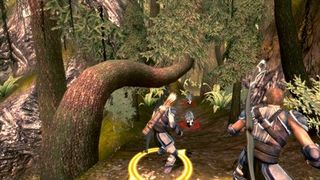
Uncertainty looms: Could I have chosen wiser words to convince my brother not to fight me? Would I have an opportunity to return to Orzammar and confront Bhelen - the conniving, conspiring council member - for his betrayal? The weight of my actions had me eager to round up new quests that I hoped would lead me to redemption. I craved a resolution to the plot that I had set in motion, that destroyed everything I held dear.
I’m recounting one of the most impactful stories I’ve experienced in a game, and I haven’t even started the main quest. I’m the first person to play Dragon Age: Origins - spiritual successor to Baldur’s Gate, crafted by the capable hands of one of the finest RPG-smiths of the modern era, BioWare. I’ve completed one of the six discrete origin stories that build a foundation for hundreds of choices that genuinely affect the game’s fantasy world. It’s an ambitious design, but it puts Dragon Age on track to be the most narratively complex, personal, and replayable RPGs out of the studio yet.
Know Your Role
Role-players relish character creation. It’s that beautiful blank slate - that special time when the imagination can forge an entire history with a few clicks, where your mental image of a daring rogue hits the page in the form of high dexterity, archery training, and dropping a dozen points into his lockpicking skill. But there’s character creation, and then there’s character creation. Think about it - does choosing whether you’re a dwarf or an elf, assigning stat points into fire magic, or tweaking bone structure sliders really tell you who you are, establish your motivation, or develop a foundation for the choices you make?
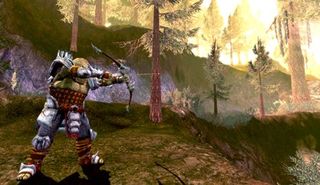
Our decisions shape us and the world around us - that’s always been BioWare’s thesis, and Dragon Age: Origins may be the most ambitious, fully realized expression of the developer’s vision for personalized storytelling and player choice. BioWare believes that players need to ease into their character’s skin, not hop into a pre-drafted hero with just a cutscene to contextualize their actions. This theory materializes in the six distinct introductory “origin stories”: players choose from a dwarf commoner, dwarven noble, city elf, magi, human noble, and Dalish elf. Filling one of these roles gives players the opportunity to make formative, significant decisions that forge a distinct background for their character before graduating to the main quest.
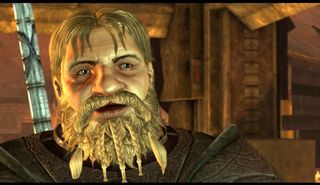
For my dwarven noble - the first character we chose during PC Gamer’s world-exclusive playtest - those decisions rest in unraveling a plot of political intrigue rife with double-crosses, assassination, and sibling rivalry. I’m the second eldest son of the king of Orzammar, the larger of two known remaining dwarf cities. Today, I’m receiving my military commission to become a commander, raising my prestige among brothers, cousins, and other houses that compete for power. My loyal companion, Gorim, reminds me that there’s a feast in my honor in the evening, and that the king expects me to attend. Picking through dialog options (rendered by Mass Effect’s smooth, cinematic conversation engine), I decide to shrug off the schedule, and make my way to an event called The Provings - an opportunity to roam the underground city and get acquainted with my bearded brethren.
Baldur’s Spirit
BioWare doesn’t own the license to Baldur’s Gate (Atari does), but that doesn’t limit the dev from iterating on the core mechanics and charm that the party-driven fantasy RPG offered. Here’s three features that help it qualify - and surpass - it’s spiritual-successor status.
Sign up to the 12DOVE Newsletter
Weekly digests, tales from the communities you love, and more
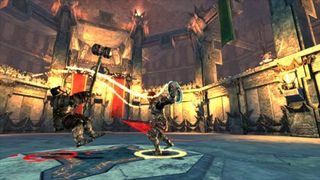
BG’s pausable combat system was a landmark for tactical RPGs, and Dragon Age wants to recreate that same sense of combat orchestration. Advanced players will appreciate DA's customizable party tactics system - an integrated way of scripting combat behavior for your allies. Have your rogue auto-heal you if your health drops to a certain percentage; have your mage boost your party’s melee damage with his flaming weapons spell whenever you cast drain life on an enemy. Programming custom AI for your partymates builds on the tactical complexity BG put forth.
Being bound to the AD&D ruleset meant Baldur’s Gate’s character creation, combat equations, spells, skills, and lore were modeled after pre-existing material: some RPG newbies were alienated by the system, and hardcore pen-and-paper players got fussy about minor rule alterations. Building Dragon Age from the ground up frees BioWare to create fresh fantasy and introduce combat mechanics like spell combos, which encourage mages to tag-team to produce devastating effects with their magic.
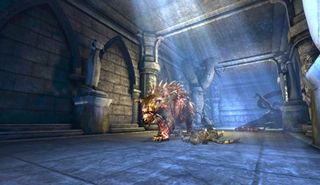
Talky party members with big personalities were a staple of BG, but having thousands of pixels instead of a few dozen to render your allies’ personas means BioWare is eager to develop new favorites for its fans. We’re not sure they’ll be as off-the-wall as Minsc from BG2 (the ranger who urges his hamster companion, Boo, into battle with lines like “Go for the eyes Boo, GO FOR THE EYES!”), but the back-and-forth between Morrigan the cynical mage and Alistair the Grey Warden had us eager for more of their banter.
Most Popular


